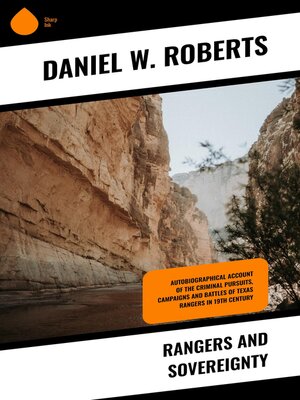Rangers and Sovereignty
ebook ∣ Autobiographical Account of the Criminal Pursuits, Campaigns and Battles of Texas Rangers in 19th Century
By Daniel W. Roberts

Sign up to save your library
With an OverDrive account, you can save your favorite libraries for at-a-glance information about availability. Find out more about OverDrive accounts.
Find this title in Libby, the library reading app by OverDrive.



Search for a digital library with this title
Title found at these libraries:
| Library Name | Distance |
|---|---|
| Loading... |
In "Rangers and Sovereignty," Daniel W. Roberts explores the intricate relationship between state authority and non-state actors in the context of contemporary governance. The book employs a rigorous analytical framework, drawing on case studies that illustrate the evolving role of rangers as enforcers of environmental and territorial integrity. With a blend of qualitative research and theoretical discourse, Roberts critiques prevailing notions of sovereignty, situating rangers not merely as agents of the state but as key players in a complex web of local, national, and international politics. This literary tapestry not only serves to highlight the multifaceted nature of authority but also invites readers to reconsider the boundaries of governance in an increasingly interconnected world. Daniel W. Roberts is a distinguished scholar in environmental policy and governance, having dedicated his career to understanding the dynamics of authority within conservation contexts. His experiences in field research across various ecosystems have profoundly shaped his perspective, leading him to articulate the often-overlooked significance of rangers in securing both natural and political sovereignty. Through this work, Roberts draws on his rich background in interdisciplinary studies, connecting insights from political science, sociology, and environmental ethics. "Rangers and Sovereignty" is an essential read for scholars, policymakers, and anyone interested in the intersections of power, ecology, and community. By illuminating the crucial roles that rangers play in maintaining order and authority, Roberts' work not only enriches academic discourse but also calls for a re-evaluation of how we understand governance in the 21st century.







